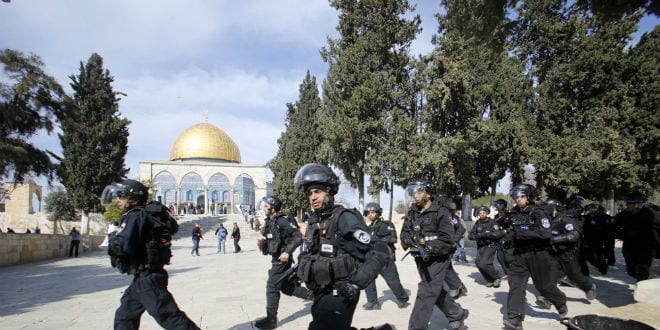
Hundreds of Palestinians attacked police officers standing at the Mughrabi Bridge outside the Temple Mount on Friday. Stones were hurled at the officers following prayer services. The violence was not unexpected, unfortunately; the previous day, the Temple Mount had been closed to Jews due to reports of planned violence. Police officers stormed the Temple Mount, using stun grenades to disperse the crowds and subdue the violence. Seven Palestinians were arrested.
Police spokesman Micky Rosenfeld reported that the violence began unprovoked at approximately 12:30 pm.
“Police responded immediately by entering the Temple Mount area and dispersing the rioters, using only stun grenades in order to prevent injuries,” he said. “Luckily, there were no injuries to officers.”
According to Rosenfeld, police had received intelligence that Arabs were planning to riot after Friday prayers, and so a heightened police presence was in place.
“Security assessments were also quickly made to ensure immediately after the riot to prevent any further disturbances in and around the Old City,” Rosenfeld said.
The Temple Mount has been a site of contention since 1967. It is holy to both Jews, who identify it as the site of the First and Second Temples, and to Muslims, who claim Mohammed ascended to heaven from there. Located in the heart of the Old City of Jerusalem, it fell into Jordanian hands in 1948. It was recaptured by Israel in 1967, but in an effort to appease the Arabs, it was entrusted to the Muslim Waqf for oversight. Since then, access to the holy site has been limited for non-Muslims. Although the Israeli Supreme Court upheld the rights of Jews to pray on the Mount, police effectively prohibit non-Muslim prayer for fear of inciting a violent response. Muslims have called for an outright ban on non-Muslim visits to the Mount, claiming their presence “defiles” the holy site.
The Second Intifada, also called the Al-Aqsa Intifada after the name of the mosque on the Temple Mount, began when Muslims rioted in protest of then-opposition leader Ariel Sharon’s visit there.
The weekend riots were only the latest in a string of violent surges on the Mount in recent months. In December, clashes broke out when two Jewish visitors attempted to pray at the site. In September, riots took place over the Jewish New Year and during the summer, the compound was again closed to Jewish worshippers wanting to visit during the period of mourning for the Temple’s destruction due to threats of Muslim violence.
The past five months have seen an overall increase in Palestinian and Arab violence against Israeli targets in general. Rocket fire towards Israeli targets in the south has increased after an extended period of quiet following last winter’s Operation Cast Lead. Terror attacks, such as December’s Bat Yam bus bombing or last week’s thwarted attack on a Jerusalem wedding hall, are also on the rise. According to the Shin Bet, terror attacks in Israel increased from 82 in July 2013 to 167 in November. A total of 1,700 terrorist acts were recorded in 2013.





